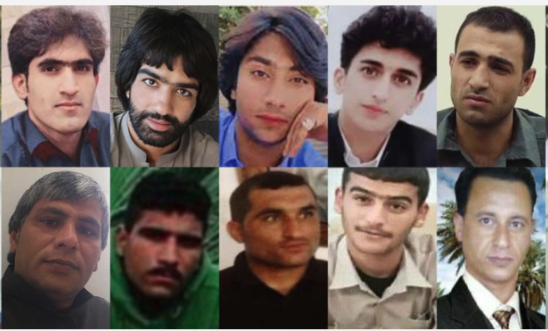
Press releases
Iran: nearly 100 people executed in first two months of this year

At least 94 put to death in January and February, with escalating use of death penalty against persecuted ethnic minorities
Horrific sexual violence and other torture allegedly used to extract false confessions
‘The Iranian authorities are carrying out executions on a frightening scale’ - Roya Boroumand
The Iranian authorities executed at least 94 people in January and February this year alone, in a notable rise in executions compared to the same time last year, according to research by Amnesty International and the Iranian human rights organisation the Abdorrahman Boroumand Center.
The figures show an escalating use of the death penalty against persecuted ethnic minorities, with 28 people from Iran’s minority groups among those executed so far this year.
Of the minority group members executed so far in 2023, 19 were convicted of drug-related offences, seven of murder, and two of the overly-broad and vaguely-worded charges of “spreading corruption on earth” and “enmity against God”, neither of which meet the principle of legality.
In late February, Iranian officials executed an Ahwazi Arab man and a Kurdish man in secret following grossly unfair trials. The authorities have also sentenced to death at least another six Ahwazi Arabs and six Baluchis in recent weeks, some of whom were convicted in relation to protests that have engulfed Iran since last September.
On 20 February, Hassan Abyat, an Ahwazi Arab man, was executed in Sepidar prison in Khuzestan province, while Arash (Sarkawt) Ahmadi, a Kurdish man, was executed on 22 February in Dizel Abad prison in Kermanshah province. Informed sources told Amnesty that, following their arrests, interrogators subjected both men to torture and other abuse to force them to “confess”. Their forced confessions were broadcast on state media in violation of the right to presumption of innocence and in an attempt by the authorities to vilify them and justify their executions. They were also denied access to legal representation and were executed in secret, with no final visit or notice given to their families.
Hassan Abyat was sentenced to death twice - once by a Revolutionary Court for “enmity against God” and once by a Criminal Court for murder - in relation to the death of an agent from the paramilitary Basij force in 2011 and alleged membership of an “opposition group”. Abyat had denied any involvement in the agent’s death. After subjecting him to enforced disappearance, interrogators tied Abyat to a bed specially-made for torture, beat him with cables and administered electric shocks to his testicles, according to a witness who also told Amnesty that scars remained on Abyat’s body from the torture. The court convicted him without investigating his torture allegations.
Arash (Sarkawt) Ahmadi, who was arrested in January 2021, was sentenced to death for “enmity against God” in connection with his previous membership of a banned Iranian-Kurdish opposition group and the death of a member of the security forces. According to Kurdish human rights activists, Revolutionary Guards interrogators forced him to give “confessions” under torture and other ill-treatment.
Roya Boroumand, Abdorrahman Boroumand Center’s Executive Director, said:
“The Iranian authorities are carrying out executions on a frightening scale.
“Their actions amount to an assault on the right to life and a shameless attempt not only to further oppress ethnic minorities but to spread fear that dissent will be met with brute force, either in the streets or in the gallows.”
Diana Eltahawy, Amnesty International’s Middle East and North Africa Deputy Director, said:
“It is harrowing that executions routinely occur amid the systematic use of torture-tainted ‘confessions’ to convict defendants in grossly unfair trials.
“The world must act now to pressure the Iranian authorities to establish an official moratorium on executions, quash unfair convictions and death sentences, and drop all charges related to the peaceful participation in protests
“We also urge all states to exercise universal jurisdiction over all Iranian officials reasonably suspected of criminal responsibility for crimes under international law and other grave violations of human rights.”
Fresh death sentences
In recent weeks at least 12 people from the Ahwazi Arab and Baluchi ethnic minorities have been sentenced to death following grossly unfair trials.
On 14 February, six Ahwazi Arab men - Ali Mojadam, Moein Khanfari, Mohammad Reza Mojadam, Seyed Salem Mousavi, Seyed Adnan Mousavi, and Habib Deris - were told they had been sentenced to death following a group trial before a Revolutionary Court in Ahvaz on the charge of “enmity against God” for alleged “membership in illegal groups” in a case dating back to 2017. According to Ahwazi Arab human rights activists, their torture-tainted “confessions” were used to convict them.
In December and January, at least six young men from the Baluchi minority were sentenced to death in separate trials in relation to protests in Sistan and Baluchestan province last September. Shoeib Mirbaluchzehi Rigi, Kambiz Khorout, Ebrahim Narouie, Mansour Hout, Nezamoddin Hout and Mansour Dahmaredeh, who has a physical disability, were sentenced to death for “spreading corruption on earth” and/or “enmity against God” for arson and stone-throwing. International law prohibits the use of the death penalty for offences that do not meet the threshold of “most serious crimes” involving intentional killing. According to sources with knowledge of the matter, interrogators subjected the men to torture, including sexual violence, to force them to make “confessions”. They stuck needles into Narouie’s genitals and beat Mansour Dahmardeh so severely they broke his teeth and nose.